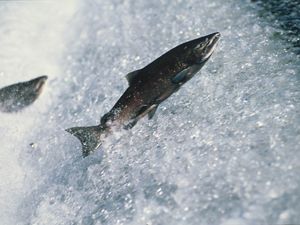Spending Bill Leaves Wildlife Behind
Robust funding, climate-smart agriculture, conservation easement reform included
This morning, lawmakers released the text of an omnibus fiscal year 2023 spending package that includes several advancements for nature but does not include the bipartisan Recovering America’s Wildlife Act.
The act, which already passed the House and a key Senate committee with bipartisan support, would invest $1.397 billion per year in state and tribal efforts to help wildlife at risk of extinction and help those species already endangered recover.
In addition to funding the government through next September, the package includes much-needed reform to conservation easement tax policy as well as legislation to support climate-smart conservation practices on private lands.
The following is a statement by Kameran Onley, Managing Director of North American Policy and Government Relations at The Nature Conservancy:
Quote: Kameran Onley
It is a disheartening loss for nature that—in the same week that international negotiators reached an agreement to curb global biodiversity loss—Congress did not act.
“We’re disappointed that, despite the many gains for conservation and climate action in this package, it will not include America’s best shot at curbing its accelerating biodiversity loss. At a time when over a third of America’s fish and wildlife species are at risk of extinction, the Recovering America’s Wildlife Act would be the most consequential legislation for wildlife conservation since the Endangered Species Act. It is a disheartening loss for nature that—in the same week that international negotiators reached an agreement to curb global biodiversity loss—Congress did not act.
“Investing in state and tribal wildlife agencies that, for decades, have been at the forefront of wildlife conservation in this country is a smart, effective and necessary step to halt and reverse America’s biodiversity decline. These on-the-ground conservation projects have a multiplying effect, not only helping conserve and recover species but also benefiting the local communities with job creation, cleaner air and water, and more outdoor recreation opportunities.
“We are grateful to the bill’s many champions that drove the bipartisan momentum over the last two years to promote its passage. We know that nature and America’s iconic biodiversity are unifying forces across the political spectrum. When lawmakers return to Washington next year, the new Congress must make reintroduction and passage of the Recovering America’s Wildlife Act one of its top conservation priorities. As the world recognized this week, we have no more time to waste.
“We’re pleased the package includes steps to end the increasing and substantial abuse of conservation easements for tax shelter purposes. This is an egregious and misleading practice that has cost American taxpayers more than $22 billion since 2016. Such tax shelters threaten the public’s continued confidence in the existing incentives for thousands of legitimate, charitably motivated gifts of conservation easements and the many landowners and conservation organizations behind them. Fixing this is a win for nature, landowners and taxpayers.
“Also included in the package are the Growing Climate Solutions Act and SUSTAINS Act. Both bills will help support the agriculture and forestry sectors’ efforts to utilize natural climate solutions. With the Growing Climate Solutions Act’s ability to accelerate voluntary carbon markets and the SUSTAINS Act’s facilitation of private-sector contributions to federal conservation programs, both are important advancements for private lands and nature.
“Despite the enormous benefits of investing in nature, funding for federal science and conservation programs has declined as a percentage of overall federal spending in recent years, and cycles of continuing resolutions have only further jeopardized those benefits. While Congress took significant action on clean energy, conservation and climate resilience with its passage of the bipartisan infrastructure law and the Inflation Reduction Act, neither will replace a robust, consistent federal budget. With the twin crises of biodiversity loss and climate change threatening our very survival, now is the time for more investment, not less. We commend lawmakers for reaching this agreement and hope this will be a step toward a regular budget process in the new year.”
The Nature Conservancy is a global conservation organization dedicated to conserving the lands and waters on which all life depends. Guided by science, we create innovative, on-the-ground solutions to our world’s toughest challenges so that nature and people can thrive together. We are tackling climate change, conserving lands, waters and oceans at an unprecedented scale, providing food and water sustainably and helping make cities more sustainable. The Nature Conservancy is working to make a lasting difference around the world in 81 countries and territories (40 by direct conservation impact and 41 through partners) through a collaborative approach that engages local communities, governments, the private sector, and other partners. To learn more, visit nature.org or follow @nature_press on X.



